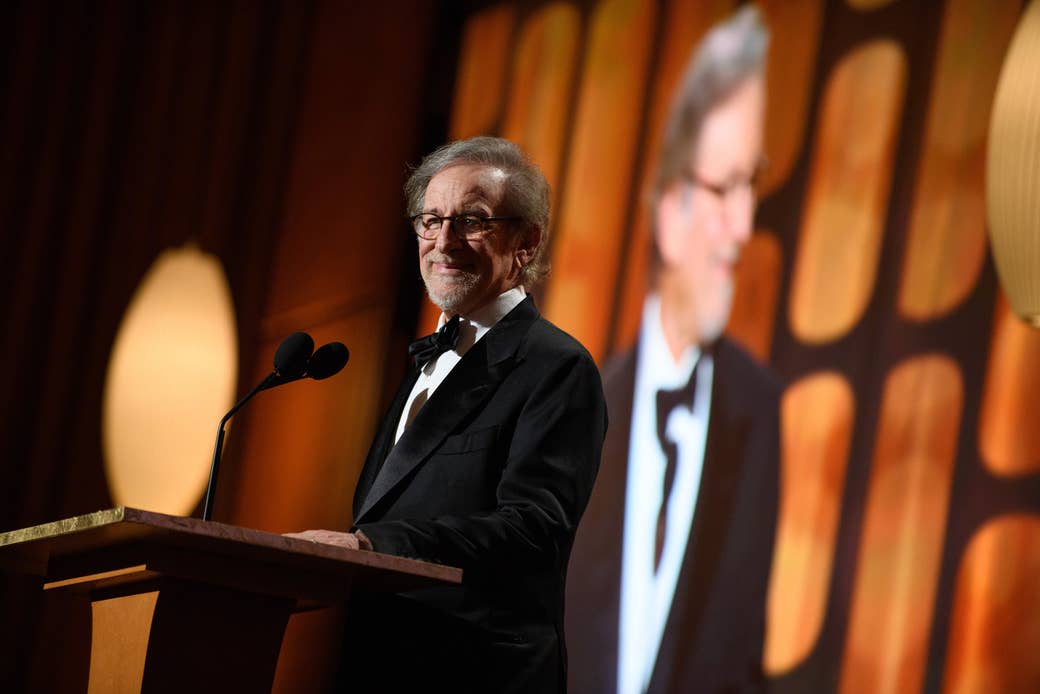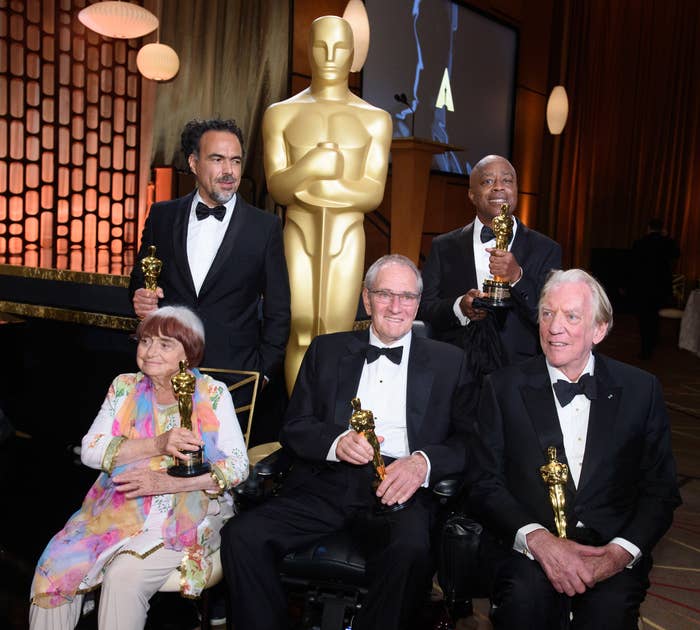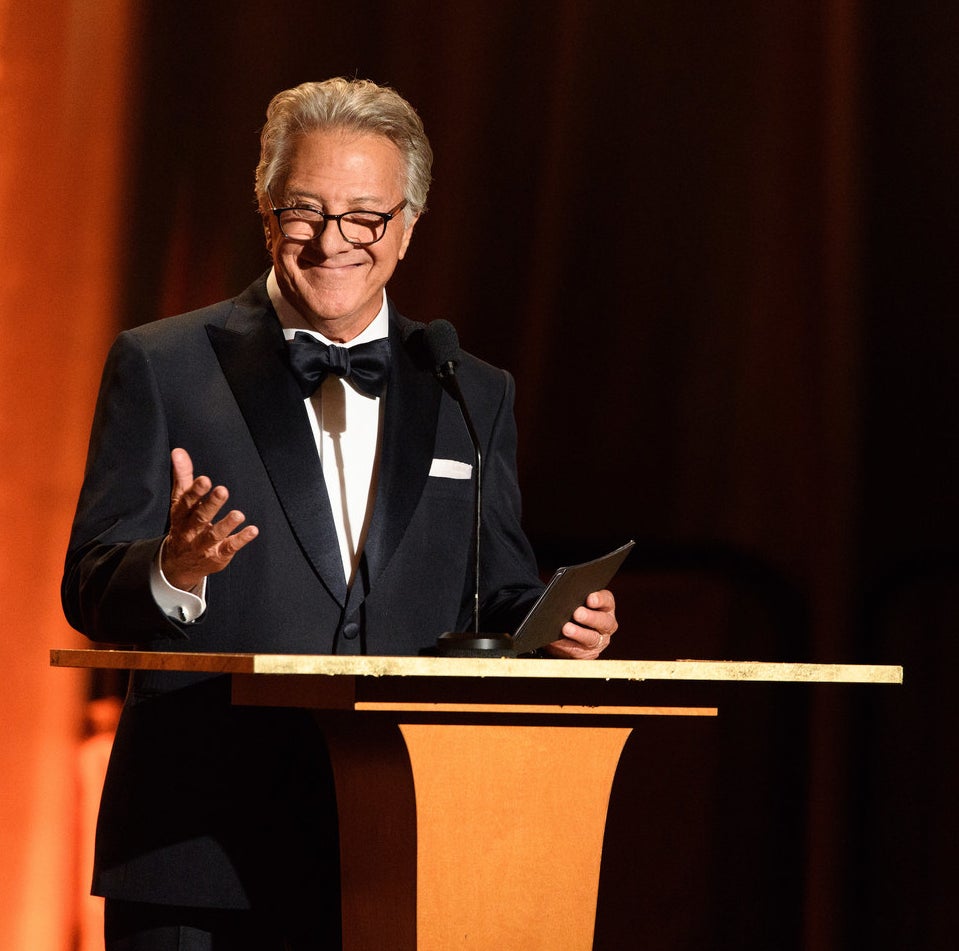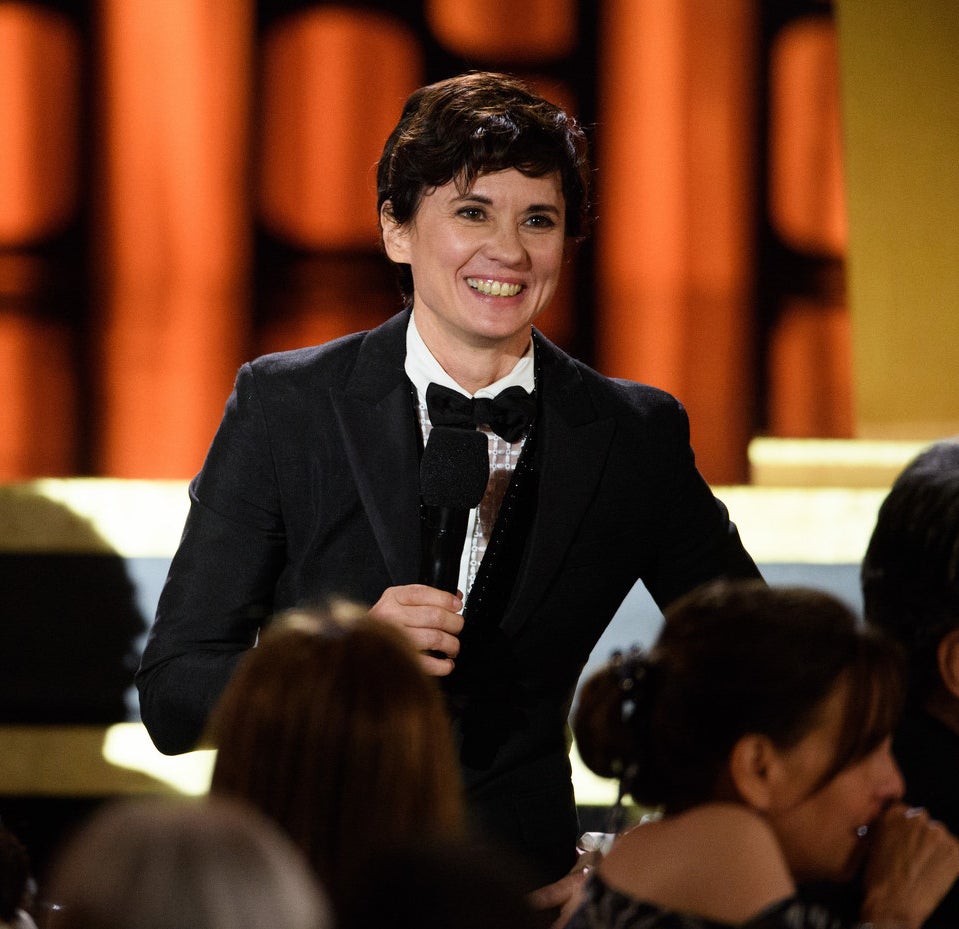
On Saturday night, an abundance of famous and powerful figures in the film industry gathered together for the Governors Awards, the annual black-tie celebration of cinema's leading artists held by the Academy of Motion Picture Arts and Sciences. Second only to the Oscars, the event featured likely the greatest concentration of cinema luminaries all year — including Steven Spielberg, Tom Hanks, Jennifer Lawrence, Emma Stone, Angelina Jolie, Ava DuVernay, James Franco, Whoopi Goldberg, Jessica Chastain, and Aaron Sorkin — along with many of the most prominent behind-the-scenes figures in the business.
And it seemed like all anyone could talk about was the Harvey Weinstein scandal and everything that has followed — but only when the microphones weren't on.
"I feel like my head is going to explode," one prominent Academy member said to me during the cocktail reception before the ceremony. "I'm getting calls every day. Everything is upside down."
"I love it," a leading director said with unsmiling resolve. "I'm happy it's finally happening."
"People are going to jail, and I'm in," a top publicist commented sternly during the dinner portion of the evening. "We're not raising our children to be in that kind of world."
Another top filmmaker recounted her shock this week at seeing the latest names to join the growing ranks of prominent male figures in Hollywood to weather allegations of sexual misconduct: "I mean, Richard Dreyfuss?! George Takei?!"
But the profusion of post-Weinstein chatter stood in stark contrast with the ceremony itself, during which not one word was spoken about the ballooning scandal that has rocked Hollywood to its core.

The disconnect pointed to an industry still reeling to grasp a sense of its own center, and, perhaps, eager to escape the explosive headlines that have consumed Hollywood, if only for one night. So, instead of an update on the Academy's plans to establish a code of conduct for its membership, recently elected Academy president John Bailey set the tone for the evening by keeping the focus on the evening's honorees, with tributes to cinematographer Owen Roizman (The French Connection), directors Agnès Varda (Cleo from 5 to 7) and Charles Burnett (Killer of Sheep), actor Donald Sutherland (Ordinary People), and filmmaker Alejandro G. Iñárritu, honored for his groundbreaking virtual reality installation about crossing the southern American border, Carne y Arena. (An Academy spokesperson said the Board of Governors will begin formally discussing the code of conduct at its first scheduled meeting next month.)
Still, Weinstein's shadow loomed over the evening. Before accusations of sexual harassment, assault, and rape from at least 70 women obliterated Weinstein's career — including the Academy's Board of Governors vote to expel him from membership — he had been one of the most towering figures at the Academy Awards. Films released by Weinstein's companies have won 81 Oscars according to Forbes, and Weinstein is largely credited with pioneering the practice of aggressive campaigning that has come to define the awards season.
The Governors Awards, launched in 2009, have become a crucial event in that campaign season, and Weinstein was often a fixture at the ceremony, glad-handing and schmoozing while the stars and filmmakers of the movies he backed got valuable face-time with Academy voters. That practice was on ready display Saturday night. Ben Mendelsohn (Darkest Hour) and Sarah Paulson (The Post) met for the first time by geeking out over each other's talent; later, Paulson posed for a photo with fellow Best Supporting Actress competition Allison Janney (I, Tonya) and Laurie Metcalf (Lady Bird). Tables featuring the casts of buzzy awards movies like Call Me By Your Name, Mudbound, The Disaster Artist, and The Big Sick were scattered throughout the ballroom, while longshot contenders like Diane Kruger (In the Fade), Darren Aronofsky (Mother!), Sam Elliott (The Hero), Laurence Fishburne (Last Flag Flying), and Richard Gere (Norman: The Moderate Rise and Tragic Fall of a New York Fixer) all put in appearances.

There were also a few uncomfortable moments, like the applause that greeted Dustin Hoffman — who was recently accused by two women of sexual harassment — when he stepped to the stage to honor Roizman, the cinematographer from the classic 1982 comedy Tootsie, starring Hoffman. And Iñárritu, who spoke about words serving as harmful "bullets" in his acceptance speech, said, "When the word, for an example, 'rapist' or 'illegal alien' is fired, the reality of a certain human life or a whole community is reduced to an idea" — causing some to wonder at first if Iñárritu was defending rapists, rather than clearly referencing the rhetoric in President Trump's infamous inaugural campaign speech.
Iñárritu's honorary Oscar, however, was in keeping with the Academy's eagerness to engage with a different pressing theme that has preoccupied the industry: the struggle for minority representation. When honoring Burnett — who spent his career as a independent filmmaker depicting the modern black experience with movies having virtually no budget like 1983's My Brother's Wedding, and 1990's To Sleep with Anger — DuVernay lauded the filmmaker as "one of the most significant American directors in cinema history of any color, period." Speaking directly to Burnett, she added, "Sir, you've been a giant to us, a legend to us, an icon long before today. To work, to create, to craft your films with no promise of industry consideration, support, or recognition, for decades upon decades, is the mark of a true artist."
Similarly, Varda's testimonials focused on her singular presence as one of the only leading female filmmakers of her generation — which meant, practically by default, that her segment came the closest to addressing the Weinstein-sized elephant in the room. In her speech, Jolie — one of the women who came forward with a story about Weinstein — pointed out that Varda was called "the grandmother of the French New Wave" when she was just 30 years old. "How she must have rolled her eyes," Jolie said. "That women artists still have to fight to be free to pursue their craft on an equal footing today is something that I imagine she never expected. So we need to draw strength from artists like Agnès."

In a hilariously profane speech, director Kimberly Peirce praised the inspiration she drew from Varda's "frank but still sexy portrayals of human desire" by relaying the fight she had with the MPAA when they gave her 1999 film Boys Don't Cry an NC-17 rating due to the length of a female character's orgasm. "I pointed out how many men have orgasms in movies," Pierce said, to increasing fits of shocked laughter. "In American Pie, [the lead character] comes twice in a row. In There's Something About Mary, [Ben] Stiller ejaculates explosively and it ends up in Cameron Diaz's hair. Men were orgasming all over the place, and they were taking a long time to do it. So why couldn't we have a long female orgasm? Who has ever been hurt by an orgasm that lasted too long? They had no answer. They're still looking."
In her acceptance speech, the 89-year-old Varda thanked "the four bright, beautiful, and intelligent women" who had honored her that night. And then she paused, and smiled. "I have a little question," she said. "Are there no men in this room who love me [enough] to speak up?"
One could imagine Varda asking that question of every man in the film industry, on behalf of every woman. And a handful of men did immediately leap to their feet, including Spielberg and Hanks, the latter of whom began yelling at the other men in the crowd to join him. Very few did.

